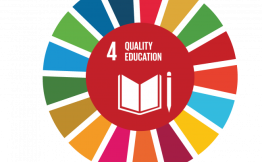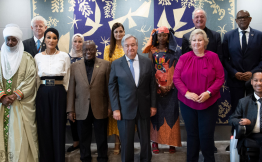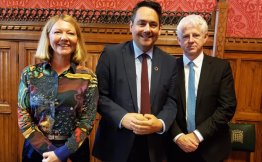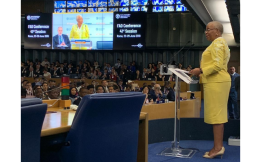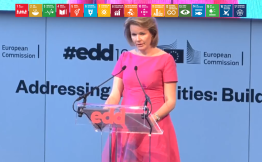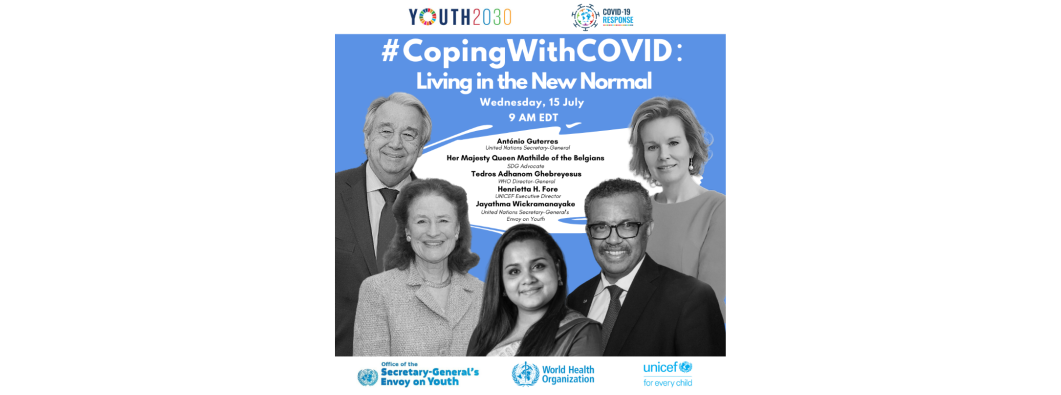
QUEEN MATHILDE AT COPING WITH COVID WEBINAR
Advocate Queen Mathilde participated in a Coping With COVID webinar with United Nations Secretary General António Guterres, United Nations Youth Envoy Jayathma Wickramanayake, and World Health Organization Director-General Dr. Tedros Adhanom Ghebreyesus to discuss the impacts of COVID19 on the mental health of individuals all around the world. The original article can be found on the United Nations Regional Information Centre.
Scroll down for French.
Feelings of fear, anxiety, anger, sadness and grief are being widely felt by young people across the world due to the impacts of COVID-19.
As governments have had to respond to the virus by enforcing measures such as physical distancing, quarantines and the closure of schools, the lives of young people have been greatly impacted.
“Many of us have worries, are feeling anxious and lonely. I worried about the safety of my family and friends and about the future,” said Xiukun Wang, a student from Wuhan, China in an online webinar focusing on young people’s mental health organised by the United Nations Secretary-General’s Envoy on Youth, Jayathma Wickramanayake.
Several young people have fears over contracting coronavirus and losing loved ones; school and university closures; as well as a loss of routine and social connections. Access to mental health services has also been severely impacted.
For World Health Organization Director-General Dr Tedros Adhanom Ghebreyesus, COVID-19 is not only a physical issue but a mental health issue.
“The mental health needs of young people need to be cared for and responded to by mainstreaming mental health services. There is no health without mental health,” he told the webinar.
Widespread impact on mental health
Studies across Europe already show the impact of the pandemic on mental health. UNICEF UK found more than 60% of UK children are worried about the impact of the coronavirus on their lives. Belgian public health institute, Sciensano, found young people aged 18-24 and students were by far the most affected by anxiety and depression during the crisis. Parents in Italy and Spain noticed that their children had difficulty concentrating, were irritable, restless and nervous.
Her Majesty Queen Mathilde of the Belgians, an Advocate for the Sustainable Development Goals, called for improved access to support and services and to fight the stigma surrounding mental health, which prevents many people from seeking help.
“Young people helping young people is essential. I hope all of us will come out of this crisis feeling stronger. Let us continue to support each other,” Her Majesty Queen Mathilde told the webinar.
Adapting positively
Young people across the world have taken actions to try to adapt positively towards the crisis. This includes staying active; taking time for themselves; learning skills; and keeping friends and family close.
“COVID-19 and responses to it have been quite challenging for the mental well-being of young people. But we have also heard terrific, inspiring stories of young people learning and navigating these challenges successfully to survive and thrive,” said Jayathma Wickramanayake.
Building a new normal
Looking to the future, United Nations Secretary-General António Guterres called for mental health to be given “the priority it has always been denied”. He urged governments to ensure considerations on mental health are at the centre of responses to the pandemic.
Guterres concluded he was “hopeful” the contributions of young people can change the way the world deals with mental health.
“Young people are in the centre of the need but also in the centre of the innovative responses to mental health,” he said.
Watch it HERE
——————————————————————————————————————————————————————
Les sentiments de peur, d’anxiété, de colère, de tristesse et de chagrin sont largement ressentis par les jeunes du monde entier en raison des effets du COVID-19. Les mesures telles que le confinement, distanciation physique, la mise en quarantaine et la fermeture des écoles ont affecté la vie des jeunes.
« Beaucoup d’entre nous ont des soucis, se sentent anxieux et seuls. Je m’inquiétais pour la sécurité de ma famille et de mes amis et pour l’avenir », a déclaré Xiukun Wang, un étudiant de Wuhan, en Chine, lors d’un webinaire en ligne sur la santé mentale des jeunes organisé par l’Envoyée du Secrétaire général des Nations Unies pour la jeunesse, Jayathma Wickramanayake.
Plusieurs jeunes craignent de contracter le coronavirus et de perdre des êtres chers, subissent les fermetures d’écoles et d’universités ; ainsi qu’une perte des liens sociaux. L’accès aux services de santé mentale a également été gravement touché.
Pour le Directeur général de l’Organisation mondiale de la Santé, le Dr Tedros Adhanom Ghebreyesus, COVID-19 n’est pas seulement un problème de santé physique, mais également un problème de santé mentale.
« Les besoins des jeunes en matière de santé mentale doivent être pris en charge et satisfaits en intégrant les services de santé mentale. Il n’y a pas de santé sans santé mentale », a-t-il déclaré lors du webinaire.
Impact généralisé sur la santé mentale
Des études à travers l’Europe montrent déjà l’impact de la pandémie sur la santé mentale. UNICEF Royaume-Uni a constaté que plus de 60% des enfants britanniques s’inquiètent de l’impact du coronavirus sur leur vie. L’institut belge de santé publique, Sciensano, a constaté que les jeunes âgés de 18 à 24 ans et les étudiants étaient de loin les plus touchés par l’anxiété et la dépression pendant la crise. Les parents en Italie et en Espagne ont remarqué que leurs enfants avaient du mal à se concentrer, étaient irritables, agités et nerveux.
Sa Majesté la Reine Mathilde, défenseuse des Objectifs de développement durable, a appelé à lutter contre la stigmatisation entourant la santé mentale, et à améliorer le soutien et les services pour permettre à tous ceux qui ont en besoin de demander de l’aide.
« Les jeunes qui aident les jeunes sont essentiels. J’espère que nous sortirons tous plus forts de cette crise. Continuons à nous soutenir mutuellement », a estimé Sa Majesté la Reine Mathilde lors du webinaire.
S’adapter positivement
Les jeunes du monde entier s’organisent pour s’adapter positivement à la crise. Cela comprend rester actif; prendre du temps pour soi; développer des compétences d’apprentissage; et garder les liens avec leurs amis et la famille proches.
« COVID-19 et ses réponses ont été assez difficiles pour le bien-être mental des jeunes. Mais nous avons également entendu des histoires formidables et inspirantes de jeunes apprenant à surmonter ces défis avec succès pour survivre et prospérer », a déclaré Jayathma Wickramanayake.
Construire une nouvelle normalité
Tourné vers l’avenir, le Secrétaire général des Nations Unies, António Guterres, a appelé à ce que la santé mentale reçoive « la priorité qui lui a toujours été refusée ». Il a exhorté les gouvernements à veiller à ce que la santé mentale soit au centre des réponses à la pandémie.
Il a conclu qu’il était « plein d’espoir » sur la contribution des jeunes pour changer la façon dont le monde traite la santé mentale. « Les jeunes sont au centre des besoins mais aussi au centre des réponses innovantes à la santé mentale », a dit le chef de l’ONU.





